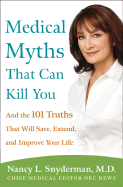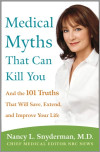

Snyderman divides her book into seven concise chapters, each describing and then dismantling a medical myth. Some seem quite basic: It is a myth that you can just "snap out" of a mental illness, for example, or that only the elderly are victims of stroke and heart disease. Other myths, however, have found surprisingly stubborn traction in this age of managed health care and miracle cures; the belief that annual checkups are no longer necessary, for example. In her discussion of this myth, Snyderman presents a chart of simple medical tests and screenings, broken down by age and gender, that can detect diseases at their earliest stages. She also discusses her own experiences, illustrating the importance of early screening.
Perhaps a more potentially harmful myth, however, is that "natural means safe." In this section, Snyderman lists many of the common herbal supplements and "cures" that are now widely available and discusses the risks and benefits associated with each. She also points out that doctors are not opposed to "alternative" treatments and that modern medicine seeks to incorporate natural remedies into traditional therapy.
Beyond these discussions, Snyderman offers plenty of juicy sound bites in the form of her "101 Truths." There is something for everyone here, for while many readers may already know that secondhand smoke is deadly and that not all fats are bad for you, many more will learn that certain types of ear wax may predict breast cancer risk and that drinking unfiltered coffee can raise cholesterol.
Snyderman's warm, accessible style is a perfect complement to her practical, scientifically proven advice. Despite the alarmist tone of its title, this is a sensible, even-keeled book full of information that will be useful to all readers.-–Debra Ginsberg

